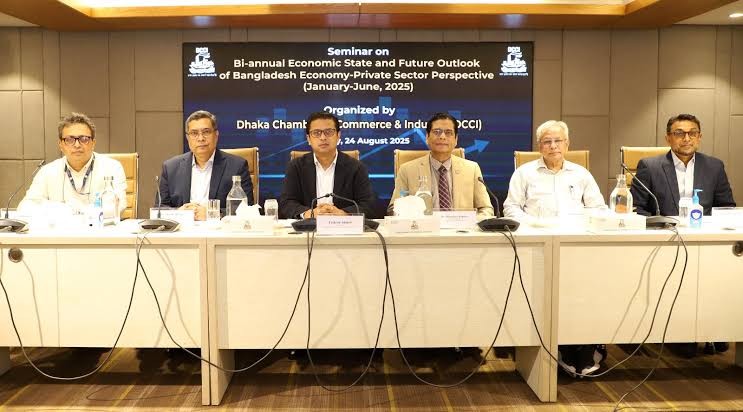Staff Correspondent
Published:2025-08-25 00:42:27 BdST
Private sector growth stagnates, DCCI calls for banking sector, political stability
The private sector in Bangladesh has not witnessed substantial growth in recent months, weighed down by reciprocal tariff measures from the United States, global political instability, deteriorating law and order, declining private sector credit flow, uncertainty over energy supply to industries, and widespread corruption.
Against this backdrop, Dhaka Chamber of Commerce & Industry (DCCI) President Taskeen Ahmed underscored the need for banking sector stability, political stability, and elimination of bureaucratic bottlenecks.
He also said Bangladesh requires additional time to adequately prepare for its Least Developed Country (LDC) graduation.
He made the remarks on Sunday at a seminar titled “Bi-annual Economic State & Future Outlook of Bangladesh Economy - Private Sector Perspective” held at the DCCI auditorium, said a press release.
Dr Monzur Hossain, member (secretary) of the General Economics Division at Bangladesh Planning Commission, attended the event as chief guest.
Global slowdown and LDC concerns
Presenting the keynote, Taskeen Ahmed highlighted the global economic situation, monetary policy, inflation, private and foreign investment, agriculture, industry, CMSMEs, ICT, energy and power, logistics, skills development, and the financial sector, covering January-June of the fiscal 2024-25.
He noted that rising tariffs and trade barriers have slowed global growth, with forecasts projecting world GDP growth at just 2.3% in 2025, lower than last year.
Considering these challenges, he suggested Bangladesh defer its LDC graduation for at least three years to strengthen competitiveness, prepare a robust transition strategy, and update policies.
The DCCI chief further emphasised that corporate tax, particularly for non-listed firms, must be made more competitive to attract investment.
Investment and trade concerns
According to him, private investment dropped to 22.48% of GDP in FY25, the lowest in five years.
On trade, he pointed out that Bangladesh’s exports fell by 3.09%, while imports surged 46.8%, posing serious risks for the economy.
To boost exports, he recommended diversification, higher value addition, stronger supply chain connectivity, and more active trade diplomacy.
Although the US has reduced tariffs on Bangladeshi products from 35% to 20%, he said Dhaka must push for further cuts to improve competitiveness.
He stressed the need for long-term strategic planning, uninterrupted energy supply, ESG compliance, and expansion into high-value product segments.
Export performance in key sectors varied: leather exports declined by 1.67% to US$567.78 million, pharmaceuticals dropped 15.88% to $98.74 million, while light engineering rose 12.40% to $285.49 million in the second half of FY25.
In the CMSME sector, loan disbursement fell by 23.6% in Q1 (Jan-Mar) compared to the previous quarter.
To improve the situation, he urged targeted policy support, including fiscal incentives, affordable financing, stable exchange rates, reliable energy, and simplified compliance.
He also suggested lowering lending rates, which rose from 11.52% in June 2024 to 12.11% in May 2025.
Government and expert views
Chief Guest Dr Monzur Hossain said foreign reserves had reached $30 billion, providing some relief, though inflation remains a concern due to rising rice prices.
He stressed balancing inflation control with investment growth, and urged more market-driven foreign exchange management.
He also called for banking sector reforms and stronger productivity for a smoother LDC graduation.
Dr Mustafizur Rahman, distinguished fellow at Centre for Policy Dialogue (CPD), noted that while inflation eased, high prices continue to erode purchasing power.
He called for extending bonded warehouse and LC facilities to other export sectors, enhancing tax collection, curbing corruption, and reducing dependence on loans to finance the ADP. He too supported considering an LDC graduation deferral.
Dr AK Enamul Haque, director general at Bangladesh Institute of Development Studies (BIDS), said the economy was resilient but unsustainable in the long term.
He warned that corruption and weak agricultural growth were undermining progress and stressed aligning agriculture more closely with industry.
Bangladesh Bank officials also weighed in. Mahmud Salahuddin Naser of the Monetary Policy Department said high lending rates were not the sole barrier to investment; energy shortages and law and order issues were equally critical.
Nawshad Mustafa, director of SME & Special Programmes, highlighted the role of digital loan disbursement, SME clusters, and shifting mindsets toward SME financing.
ADB’s Md Rabiul Islam stressed trade connectivity, lower transport costs, wider use of man-made fibres in ready-made garment (RMG), and sectoral diversification.
Members of the DCCI Board of Directors and relevant stakeholders were also present.
Unauthorized use or reproduction of The Finance Today content for commercial purposes is strictly prohibited.


